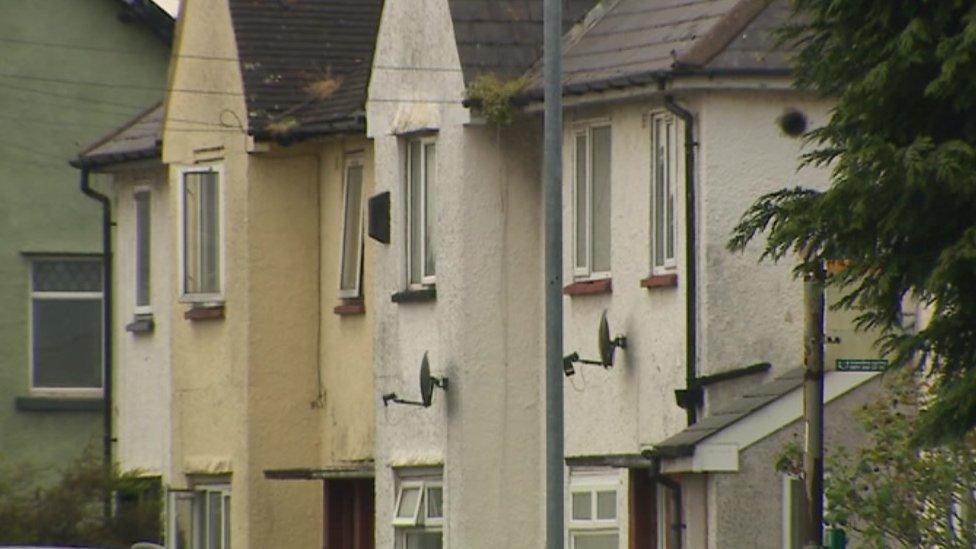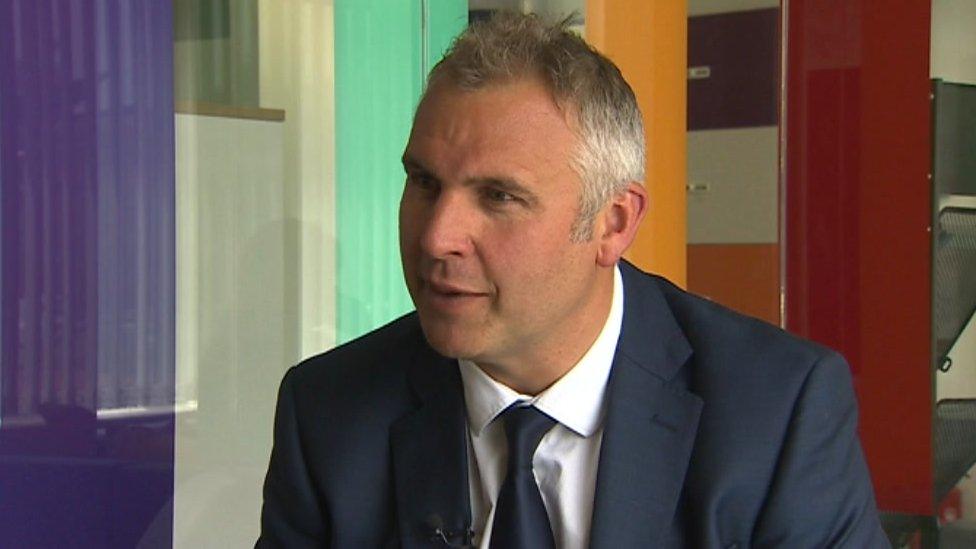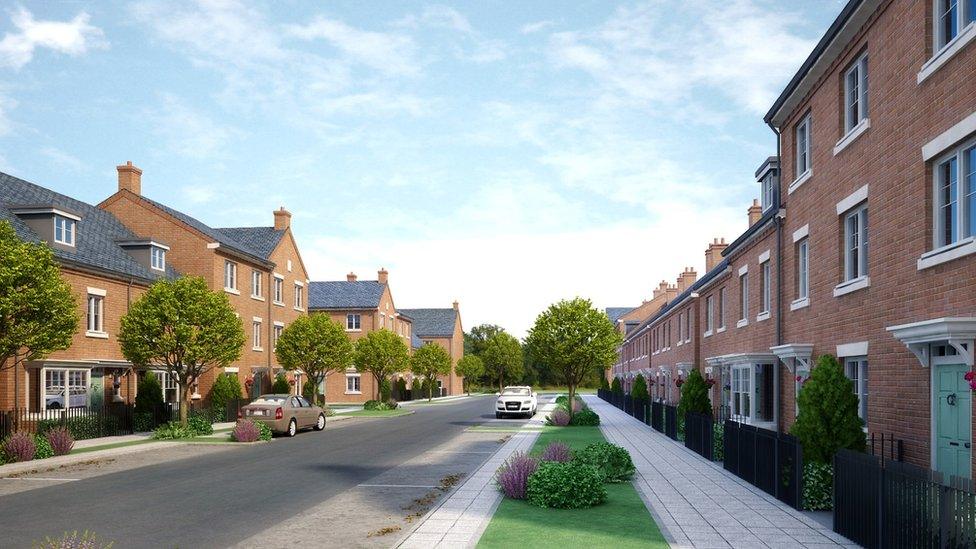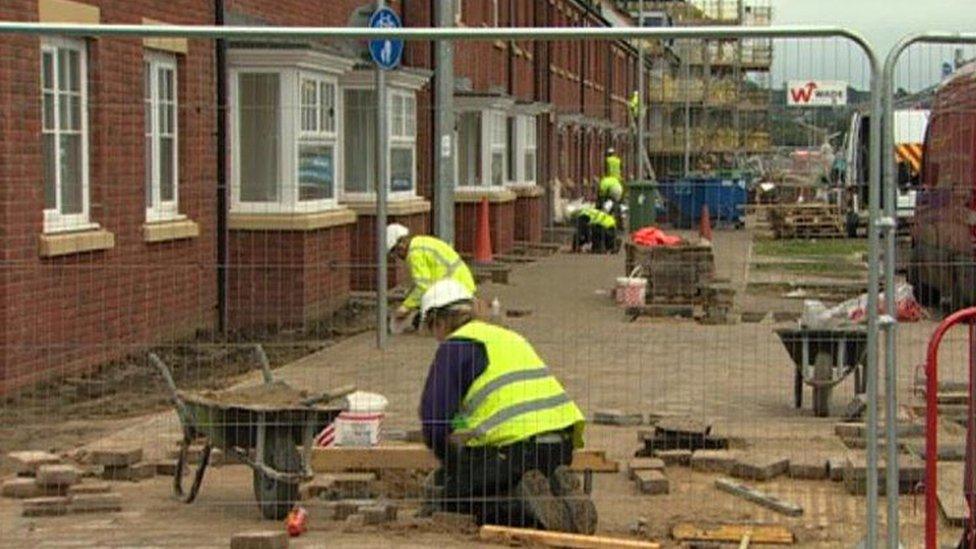Homeless fear over sharp council house rent rises
- Published
Social housing tenant shares her fears over rent rises
A mother-of-three fears she could be made homeless if the rent on her council house continues to rise.
Sharon White moved into her home in Hawarden, Flintshire, 18 months ago, but said increases mean her rent now costs an extra £700 a year.
She spoke out as homeless charity Shelter Cymru said it had been inundated with calls from tenants.
Social landlords said they were trying to keep rents affordable while building more homes.
A funding formula agreed with the Welsh government means some have seen a 4.5% rise since April.
Shelter Cymru said since then it had received "hundreds" of calls from worried tenants, who have seen an average payment increase by about £300 a year.
When she moved into her council house, Mrs White, who used to work as a teaching assistant but had to stop due to a lung condition and a spinal condition, found the £440 a month rent affordable.
Mrs White gets £2,000 a month as part of divorce settlement, which will end in March 2020, but said she was having to cut back on food and clothing after two increases saw her bill go up by £60 a month.
She said her daughter Emma, 21, was trying to help cover the bills out of her part-time job, but she was now worried they could end up on the streets.
"I thought council housing - affordable housing - is for people like me and lots of other people who found themselves perhaps on hard times," she told BBC Radio Wales' Eye on Wales.
"It's getting to the point now where food is becoming less of a priority because the rent has increased so much in such a short space of time.
"My medication's been upped because my stress, my anxiety - thinking this time next year, could we be considering going homeless if this rent increases again - that's the reality."


How rent is calculated
For the past five years the maximum rents can increase for council and housing association tenants has been set using a formula agreed by the Welsh government and landlords.
The formula takes the Consumer Price Index inflation rate from the previous September and adds on 1.5%. Landlords can also add a further £2 a week.
Last September, inflation was at a five-year high of 3% which meant the maximum rent increase was 4.5%, plus £2 a week.

The Welsh Local Government Association, which represents the 11 local authorities that retain their council house stock, said a review of its rent rise formula was under way.
It said that decisions on rent levels were made every year by each council, within the boundaries of the rent policy set by the Welsh Government.
An independent team of academics will present their recommendations to the housing minister Rebecca Evans, who has the job of balancing the needs of both social landlords and their increasingly squeezed tenants.
John Puzey, director of Shelter Cymru, said its helpline had been "absolutely inundated" when the rent rise letters began to drop through people's letterboxes.
"If you've been on an income that's been stagnating for the last couple of years, or if you're subject to benefit cuts or caps, then that sort of increase could be very difficult for you," he said.

Stuart Ropke says 'competing pressures' dictate how housing associations set rent prices
While endorsing this year's rent rise formula, the Welsh government asked social landlords to consider the level of inflation and affordability and, where possible, to apply a "lower uplift".
But at least two councils - Swansea and Cardiff - applied the maximum increase, potentially adding £300 a year to rent bills.
Plaid Cymru's shadow minister for housing, Bethan Sayed, has written to every housing association in Wales to find out how they approached the business of setting rents.
Of 27 that responded, 11 increased rents by the full 4.5%.
"Many of those said they had consulted their board and tenancy board in doing so, but I didn't get a more comprehensive analysis from them as to why," she said.
But Stuart Ropke, chief executive of Community Housing Cymru,which represents the housing association sector in Wales, said members "considered very carefully where they pitch their rent increase" while needing to build new homes to meet demand.
Housing associations say they plan to build 13,000 affordable homes in Wales by 2021.
Eye on Wales, BBC Radio Wales, 27 June at 18:30 BST
- Published27 March 2018

- Published9 June 2018

- Published17 October 2017
